- Home
- Sarah Hall
The Electric Michelangelo Page 7
The Electric Michelangelo Read online
Page 7
– Do we know Mr Riley?
– I know of him, love.
– What’s a scraper?
– It’s a man that does tattooing. Your dad had a tattoo on his shoulder. Lots of men of the sea do. Sort of like a club badge, though it’s quite a personal thing.
– Why was he not mad about the window pane? Why did he help us cut Kaiser Bill down? Is he a radical?
– Oh, goodness knows. Perhaps Mr Riley is a Bolshevik, son. I believe there are a few around.
Cy did not mention his feeling of déjà vu, that grave-robbing look between them of retrieving a body they both had some loon-moon claim to. It was as if the man had recognized him. It was as if he had been expecting him. That’s how the eyes had seemed.
There were times when initial introductions were so vested with something other as to confuse and distract and entrance both parties, Cy would realize later. And only further into relationships when you knew the person better, and their place in your life became clear, if there was love, if there was hate, if there was deepness of any kind, only then did you understand that the embers of meaning had been present all along and glowing since that first moment you laid eyes on them. As if you already knew them before you came to know them. As if some rift had bent time.
Eva Brennan, on the other hand, gave him no such early forecast that she would trample on his heart. Life had been ticking along just fine until she stepped a dainty foot through the Bayview’s door with her mother and father two years later, lent like the weather, like the bright borrowed days in the northern counties that early guest season of 1920. She was the loveliest thing Cy had ever seen, beside Aurora Borealis and Gaynor’s nipples. She was fourteen. She was blonde. And had freckles on the backs of her arms. She didn’t have tuberculosis. Her mother had made her a flower bonnet to wear in the Easter parade, with blue cornflowers in it that made her eyes seem darker and sadder. In the citrus light of the spring bay parade the hair on her temples had an aura of something fairy-spun. For three days Cy tried to tell her that he liked her by giving her an extra large helping of cabbage at dinner, and hanging her coat up on the stand whenever she came in. She always smiled at him. As if curious and waiting. When he lay in bed at night and thought of her two rooms away his legs and chest ached, as if he’d spent the day on the school’s pitches at the bottom of a scrum, and his now basally controllable cock rose, bowed, and rose again. There was only one thing for it – he would have to enlist the help of the boys in order to woo her. Jonty had had more experience with girls, being not averse to handing out his mother’s beauty potions in the school yard and having kissed two at least for payment to the best of Cy’s knowledge, which was two more than he ever had. He invited his friends over to formulate a plan of action. Morris said he would rather go fishing than watch anyone fumbling with a girl, and that Cy could hook her Pisces vaginales if he wanted, but he himself fancied a nice flounder for his supper. Morris hadn’t quite got the hang of girls. Jonty was only too happy to assist.
– Does she have big bosomers?
– Biggish.
– Bigger than a bee sting?
– Yes.
– Marvellous.
On the last day of the Brennans’ seaside vacation Cy and Eva and Jonty went for a walk along the beach. Jonty was always good for getting people talking. He could talk the hind legs off a donkey. It was low tide and Cy was determined to find a shell or two to add to Eva’s collection. He walked down to the waterline keeping his eyes peeled for a worthy specimen – something she could put on her vanity dresser when she went back home to Yorkshire, and she’d remember him and write him letters glancing up at it, pink and glazed inside with the light coming through it like thin bone china, sitting next to a hairbrush spun with her blonde hair. And she’d sign her name with an X at the bottom of the page signifying their first kiss on the shore at Morecambe, shortly to be undertaken. So peeled were his eyes between bubbled seaweed and smooth shingle, that he drifted off away from the other two as they chatted. So peeled were they that he missed their abbreviated courtship, the giggle of innuendo, the not-so-accidental brush of hands together as they strolled, the sharing of an ice-cone – trailing tongues along the paths made in the vanilla cream by each other. When he looked up, finally defeated in his search for a suitable love-token, he could see them standing very close together. And Eva put her arms up round Jonty’s neck, and gave him the kiss that was supposed to be Cy’s. Every bone in Cy’s body let go of its neighbour and clattered down inside him to the sick soles of his shoes. It was as if somebody had taken a wrecking ball not only to his skeleton but to his porcelain-baked, sea-delicate, pink-lit aspirations as well. When they were done kissing Eva turned to Cy and waved, then tickled Jonty in his ribs, and she went alone back up the beach steps to the prom and then back to the Bayview Hotel, where she packed her suitcase full of bonnets and shells and that afternoon left on the train to Yorkshire with her parents. Cy would probably have been too tall to kiss her anyway, Jonty informed him as they sat on the bathing pool wall later that day, even if he had got round to it, and his you-know-what would have likely bayoneted her in the stomach.
There were to be other kisses for Cyril Parks, with girls of varying statures. He drank extra milk for mending his weakened spirit and bones and put himself back together. He forgave Jonty, who hadn’t known the whole truth of the matter, he insisted, and bit by bit Cy acquainted himself with the messy, mistimed, warm and wet-patched world of courting. But Eva Brennan had done her part and remodelled his anatomy, if for no other reason than she was the first to break him. His bones felt still a little weak, as if once having been dislocated from each other they would never again bear quite such romantic weight. And he stopped riding the toboggans and the wooden coasters in the fun parks of Morecambe, not being able to take pleasure in the sensation of being boneless any more, the feeling of having something falling out of him, like hope falling down brittle as calcium dust to the empty shore.
Boggarts and eels and bore-running behind them, the boys found part-time employment around the town so as to be able to help out at home, purchase tickets to the pictures and chips from the kiosks. Cy got a job after school and on Saturday afternoons at the print shop on Strickland Street. The printers was owned by Reginald Greene, who droned on about the war and how he’d never sleep another full night for the perpetual ringing in his ears of explosions, and how his wife was as cold as a fish when she moved past him after his return and that he might as well have perished in the bloody trenches for all she cared. Greene paid him enough to keep him amused at weekends and some went to his mother, which gave her a proud look every time an envelope was handed to her and she would mark it up in its own separate column on the page of her weekly accounting log. Then she would produce Stanley Parks’s old curved pipe from the kitchen drawer, pack it with tobacco and have a smoke. Cy was never sure his mother truly enjoyed smoking for she sneezed frequently as she partook and her eyes watered. The act seemed more compulsive and obligatory than a pleasurable habit, but he knew better than to question it. Reeda had her ways.
The work at the printers was decent, straightforward and repetitive, giving him a chance to develop his artistic proclivity and perfect his lettering. There was something satisfying about surrounding bright paints with fat black borders. There was something pleasing about blocking and keeping colour. It was a nice job. And for a time he felt well suited and well spent in life. Aside from the wrinkling up of girls’ skirts and shortly thereafter the wrinkling up of their foreheads in protest, the tedium of Greene’s curmudgeonly company with its nocturnally repressed urges, and the occasional cauliflower ear or black eye received while flanking on the school rugby pitches, if there were years in his life which he would call smooth and peaceful and easy it would be these. Even so, at the back of that thought, at the bottom of his memory, in the rafters of his mind, he knew some alternate state of being must soon exist, a converse influence, that which weighed down the rusty pan on the darker
side of the scales to balance its shiny partner. The things of the universe being equal as they always were.
Eliot Riley swore he was the first man to try graduated black shading and make it work, though Cy would hear that claim repeated in the booths of Coney Island a decade later. Riley could create an illusion on a flat surface of skin. The things he could do with black ink and shading on flesh were quasi-magical. He was an engraver, like William Blake. He was a sculptor, he was a Bernini, had Cy heard of Bernini?
– No.
– Well what in God’s great name is being taught in the school these days if not the finer aspects of art, sonny?
– We did draw fish on the beach when the war was on.
– Fish on the fucking beach?
Riley had him cornered by the bait and tackle shop, next to the printers in Strickland Street, in the late afternoon drizzle. Cy knew it was him, the face and eyes were unforgettable. He had a visage that was photographic, not attractive in its looks but memorable, bringing back images of it during previous meetings with a flash of the brain’s bulb and the fizzle of recollection like burnt celluloid. It was a face that was architectural, having a structure that was soundly constructed and defined and heavily employed, as a bridge that carries too much traffic. His skin about the scaffolding of bones was smooth and opaque and olive, as some of the Welsh or southern Celts will have accompanying dark hair. He was unshaven, as blue-eyed as a Siamese cat, and apparently not one for conventional conversation. He slapped Cy’s hand away as Cy tried to turn up the collar of his coat against the fine rain to prevent it from blowing into his ear, and continued outlining what was some oddly mannered work proposal. This apprenticeship was a fucking honour, Riley stated, if he wanted it, if he was visionary enough to see it. He said his own technique and style were dimensional in a way others would kill for in the industry. Likely kill for mind, such was the game he played. And if Cy spoke of these skills out of turn to anyone, after being taught, if he got loose lipped in the pub at weekends, he’d pay for it with a hiding such as he doubted the boy had had since his father passed, rest him. Cy did not mention that he’d never met his father, that the man had been dead long before Cy’s backside had been ripe for any kind of hiding. If any of Riley’s designs made their way down to any of the other tattoo shops in town, particularly Larrikin Harry’s, that cheap tuppenny scraper on Lowther Street, Cy would be held directly responsible for it. And get a hiding. Genius, and make no mistake, Riley was a genius, was to be protected fiercely as a knight protects a king, did he understand that concept? With a bit of luck Cyril Parks might learn a thing or two about honour along with tattooing. If he wanted the apprenticeship.
– I’ve got a job, Mr Riley.
One eyelid flickered down and up on the whiskered face of the man like an insect stalling in the air. Making him look threatening, delinquent even. Riley let his jaw go slack, the too-big tongue swelling out in the rain. Perturbed, Cy looked away, into the window of the novelty sweet shop opposite, to escape the madman’s stare. There was a sign in the window that Cy had made which read ‘World’s first lettered rock’. Underneath was a stack of white sugar tubes with ‘Morecambe’ written through them in red. Then a booming, spitting laughter erupted from the man, splattering the left side of Cy’s face, interrupting his distraction and drawing his attention back to Riley.
– Right, you do lad, you do, but it’s about as useful as a mickey in a nunnery.
The laughter was an erratic feature, which Cy would become used to from his future employer over the years, though he would not become any more astute in predicting it. He looked back at the man, found that he was now grinning with his large top teeth resting on his full lower lip. Eliot Riley was dressed like a buffoon, with an old long-tailed suit and a white smock shirt underneath it, a woollen hat – the one Cy had seen appearing from his window during the Peace celebrations – and woollen gloves. It was as if he’d visited every charitable church sale and flea market in Morecambe and been donated each item separately.
– Look, lad, it’s too bloody cold to be standing about outside in the pissy weather getting gout. What say I take you for a jar and we discuss this thing further along in comfort. It’s a Dog and Partridge day, I think.
Riley put a hand on Cy’s shoulder and propelled him down Strickland Street where the wind, coming in off the great bay strengthened and propelled him back. The lights along the promenade did little to brighten the street. The tail end of autumn was lashing and extinguishing all pauper attempts at illumination. They rounded the corner onto Marine Avenue and were roared at by the arguing marriage of sea and sky. Riley wrestled the door of the pub open and shoved Cy inside. Cy had never been into the Dog and Partridge before, he had not in fact made it into any of the town’s drinking establishments. It was more maritime sea-dog’s haunt than gamekeeper’s sporting inn within, and it was just after four o’clock in the afternoon on Saturday. There were only a few brave customers, most were safe in their homes if they were sensible, the rest straggling back from the cancelled races. A man was wiping the bar down with a cloth, he nodded his head to Riley when they entered, in cursory greeting. The windows were rattling in the November gale. The floor was swept by stealthy, nautical gusts of air that sloped in under the gap of the door and through the loose panelling round the window-frames. The whole bar seemed buffeted. It was like being inside the creaking wooden bowels of a ship, while its gaff and staysails were broadsided by a forceful swell. On the walls of the room were old photographs of local fishermen and paintings of schooners. Cy wondered if his father was among them. The bar room smelled of smoke and hops and chowder. Not wanting to seem unaccustomed to such surroundings, Cy removed his cap and hung it on a peg on the wall by the door. Riley kept his woollen hat firmly on his head and they sat at two tall wooden stools alongside the bar.
Riley insisted on a drink before work, every day, as Cy found out during this first hour of the man’s company.
– To relax the hand and oil up the humour. Men like humour from a tattoo artist, to put them at ease. Lesson number one, cut up the tension before the skin, sonny, that’s a free lesson ‘cause you’ve not give me an answer to my offer yet. Two pints please, Paddy, best make it ale for junior.
The barkeep served them and continued wiping. Riley paid for his own drink and jerked his head to the side towards the barman for Cy to take care of his own payment. As luck would have it, Greene had given him his wages that afternoon, so he was not short of money. He reached into his pocket and set several coins on the bar, not knowing how much the cost of a drink was. The barman took his due and left the rest, a tug of a smile pulling at the corner of his bearded mouth.
– First pint a man imbibes he should have paid for off his own back with wage from honest work. Eh? Isn’t that right, Paddy? Paddy Broadbent, Cyril Parks. Oh, and listen lad, call me Riley. Eliot was my mother’s worst idea. Cheers.
– Cyril was my mother’s worst idea.
Cy attempted some humour of his own, being somewhat nervous about the man’s company and about venturing in to his first ever pint of ale.
– Don’t bad-mouth your mam, boy. She’ll not take kindly to hearing about it.
Cy’s damp, fledgling banter dried up. Riley made him uneasy and charmed him at once, and it was a hangman’s charm of the kind that keeps the crowd nervously enthralled. Cy might have left earlier than he did but for the man’s compelling combination, that and the sense he had stepped across a threshold with this individual, which joined them in a rebels’ pact of some variety. Four drinks into the afternoon Riley’s lessons were expanding, philosophically, and Cy was feeling a very dull and blurrish head on him, trying to keep up with his employer’s pace. The trade was changing, Riley insisted, wasn’t what it should be. Some bad characters were getting in on it. He didn’t elaborate on what exactly constituted a bad character, and Cy was left wondering what murkier levels lay beneath Riley himself who elicited notoriety for his faith and his founding, and who had a repu
tation of practising his craft on the severed heads of farmyard animals. It was those without a calling that Riley scorned, those for whom the profession was about self-inflation, braggery, and big-man’s sport, those who relished the coarse top coat of it all. They were scrapers, scratchers and scoundrels, he was an artist through which anomalous human messages were conveyed.
As stout gave way to spirit, Riley proceeded on to personal matters. There was no way Cy should consider him a father figure, that was absolutely clear. Not unless his mother could be brought into the equation.
– Fine legged woman, your mother, I saw her at the fishmonger’s last Thursday buying cod for her guests at the hotel. A good ankle on her. Oh, yes. A fine woman.
Spitting laughter from the man. He went on with the conversation again, while the room sailed out to sea a little further for Cy and he swayed on his stool. No. Riley did not need the obligation of a son, not even a part grown-up and useful one. This was business, open and shut. He had seen Cy’s work at the printers, his hand was fair. Fair was flattery in his book, he’d say no more than that. Riley thought it unfortunate and somewhat foolish not to bestow upon the world his extraordinary gift when he passed away, at this juncture the man left off for a moment, crossed himself profoundly and then in reverse, kissed the back of his wrist and took a lengthy swill of drink. He’d been considering an apprentice for a time now. Found one, potentially. That was that. Death did not scare him, by the way, no. All death would do was secure his place in history as the considerable artist that he was, the way Van Gogh’s life was celebrated after he’d lived it out in poverty. Had Cy heard of Van Gogh? And as far as he was aware he was not up for that prize soon, he did not have a dicky ticker, nor a tricky dicky, spitting laughter, so there was little rush in the matter of bequeathed craftsmanship and genius endowed. Cy should find himself some patience, maybe by the summer he’d be ready to help out with the barrage of holiday-makers wanting tattoos, oh yes, barrage, for his was not a slender occupation. And Riley was ready to teach. Because there came a point in every man’s life …

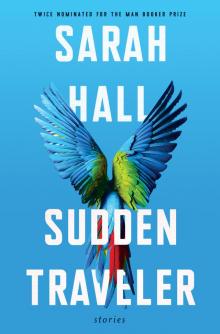 Sudden Traveler
Sudden Traveler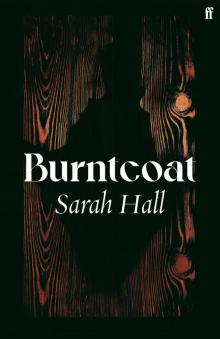 Burntcoat
Burntcoat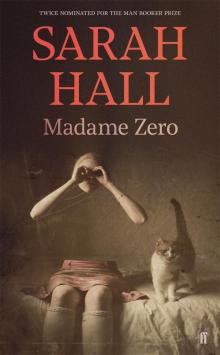 Madame Zero
Madame Zero Mrs Fox
Mrs Fox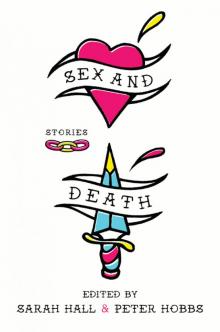 Sex and Death
Sex and Death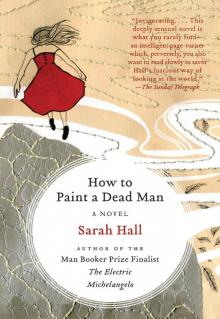 How to Paint a Dead Man
How to Paint a Dead Man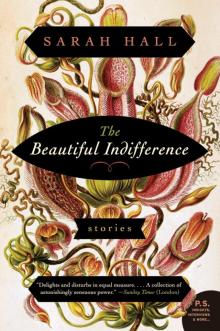 The Beautiful Indifference
The Beautiful Indifference The Wolf Border
The Wolf Border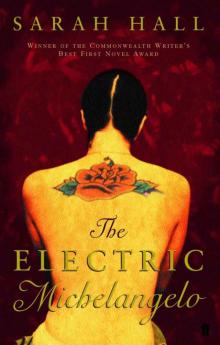 The Electric Michelangelo
The Electric Michelangelo